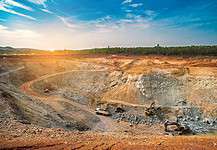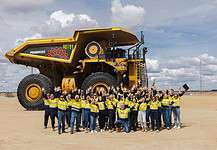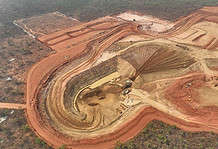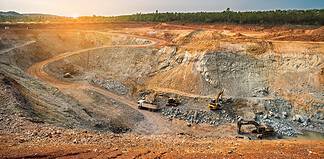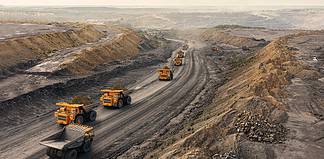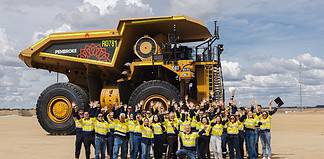All images: Pacific National.
BY ELIZABETH FABRI
RECENT worker strikes over employment conditions have not hampered Pacific National’s next round of developments under the fresh leadership of former BHP chief operating officer Dean Dalla Valle.
It’s been an eventful six months for interconnected rail freight operator Pacific National.
In July, veteran mining executive Dean Dalla Valle was appointed chief executive of the company to replace David Irwin; a defining moment as Pacific National lays the groundwork for its next wave of growth options.
Best known for his four decade run at BHP and recent work taking personal control of the global miner’s response to the tragic Samarco dam disaster in Brazil, Mr Dalla Valle left BHP in March.
His move to the freight industry mirrored former Rio Tinto Iron Ore chief executive Andrew Harding’s decision to join Aurizon as its new chief executive back in December 2016.
In August, less than a month into the new role, Mr Dalla Valle had inked a deal with major competitor Aurizon to purchase its Acacia Ridge Terminal south of Brisbane in a bid to supplement Pacific National’s national terminal network.
Separately, Pacific National also signed a binding agreement to take over the Aurizon Queensland Intermodal business as part of a consortium with Linfox.
The intermodal business had been operating at a financial loss for some time, which Aurizon attributed to issues around establishing significant scale and a customer base to support the business in such a highly competitive market.
“Queensland Intermodal supports Pacific National’s strategic objective to grow in important markets and allows for Pacific National to offer new northbound services and southbound services within Queensland on day one,” Mr Dalla Valle said.
As part of the deal, Aurizon will sell two components of the Intermodal business and close the third.
Aurizon would also transfer about 350 employee positions as well as assets, commercial and operational arrangements to the Linfox and Pacific National consortium, on top of the 30 Aurizon employees it would transfer under the Acacia Ridge deal.
Total consideration for the two transactions was $220 million, and if the Acacia Ridge transaction was not complete within six months, Pacific National would have to fork out an additional $5 million.
Both agreements were now awaiting approval by the Australian Competition & Consumer Commission (ACCC) and the Foreign Investment & Review Board.
But Pacific National didn’t stop there.
On 24 October, the company announced it would commit $35 million to kick start the development of its Parkes Logistics Terminal project; a major inland freight port on the junction of two of Australia’s national rail lines.
“Parkes sits at the epicentre of Australia’s rail freight network,” Mr Dalla Valle said.
“Located at the intersection of the main western railway line running from Sydney to Perth, the future Inland Rail corridor from Melbourne to Brisbane, and the Newell Highway, Parkes is the perfect place to establish a major intermodal freight terminal.”
The $35 million spend included $18 million to begin development of the terminal site and $17 million to acquire ‘rolling stock’ like freight wagons.
Pending final Government approvals, once developed the terminal would have capacity to process about 450,000 cargo containers each year, and the ability to haul double-stacked containers from Parkes to Perth.
Construction was expected to begin by mid-2018 with first trains hauling freight at the terminal in early 2019.

Pay Disputes
Pacific National has also been concurrently embroiled in industrial action over issues with new employee enterprise agreements.
The company has been in negotiations with the Rail, Tram and Bus Union (RTBU) since May concerning worker conditions, such as pay, breaks, RDOs and better quality accommodation.
At the beginning of negotiations the RTBU submitted an application to the Fair Work Commission to have one enterprise agreement for all Pacific National employees at the request of members.
In October, Pacific National informed RTBU it would proceed with two separate agreements for its bulk freight and coal haulage businesses.
In response, in the last two weekends of October, the union organised two 48-hour strikes involving hundreds of Pacific National’s train workers.
According to Platts, the strikes resulted in the cancellation of 90 trains in the first weekend, causing delays to Newcastle coal shipments.
The company usually runs 500 freight train services each week in NSW covering the transport of coal, cement, aggregates, and other bulk products such as grain, and livestock.
Pacific National said it had the “highest regard” for its train crews and said it had continued to negotiate in good faith with the RTBU for a new enterprise agreement for its NSW bulk freight business unit.
“Pacific National is continuing to work towards a timely resolution in the best interests of our employees, customers and the business, and we are working around this industrial action to meet our customers’ needs,” the company said.
“We are not looking to reduce the terms of employment of our train crews, but simply want to better utilise the hours they are being paid, to help the company remain efficient in a competitive sector.”
Pacific National and RTBU are continuing negotiations to discuss a way forward.


